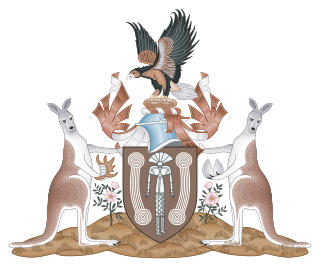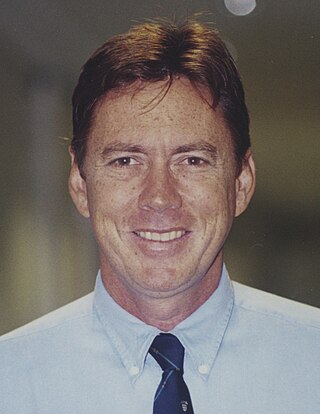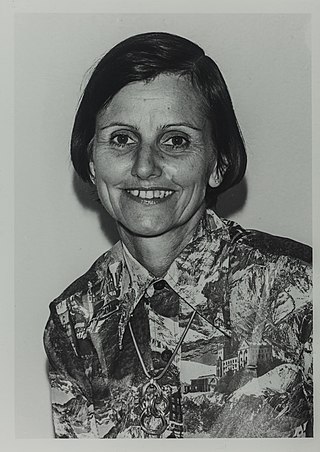
The Country Liberal Party of the Northern Territory (CLP), commonly known as the Country Liberals, is a centre-right political party in Australia's Northern Territory. In local politics, it operates in a two-party system with the Australian Labor Party (ALP). It also contests federal elections as an affiliate of the Liberal Party of Australia and National Party of Australia, the two partners in the federal coalition.

The chief minister of the Northern Territory is the head of government of the Northern Territory. The office is the equivalent of a state premier. When the Northern Territory Legislative Assembly was created in 1974, the head of government was officially known as majority leader. This title was used in the first parliament (1974–1977) and the first eighteen months of the second. When self-government was granted the Northern Territory in 1978, the title of the head of government became chief minister.

Marshall Bruce Perron is a former Australian politician, who was a Country Liberal Party member of the Legislative Assembly in the Northern Territory from the formation of the Assembly in 1974 until his resignation in 1995. For the last 20 years, save for an 11-month break in 1986 and 1987, he served as a cabinet minister or its equivalent. From 1988 to 1995, Perron was the Chief Minister of the Northern Territory.

The Legislative Assembly of the Northern Territory is the unicameral legislature of the Northern Territory of Australia. The Legislative Assembly has 25 members, each elected in single-member electorates for four-year terms. The voting method for the Assembly is the full-preferential voting system, having previously been optional preferential voting. Elections are on the fourth Saturday in August of the fourth year after the previous election, but can be earlier in the event of a no confidence vote in the Government. The most recent election for the Legislative Assembly was the 2020 election held on 22 August 2020. The next election is scheduled for 24 August 2024.

Susan Jill Carter is an Australian politician. She was a Country Liberal Party member of the Northern Territory Legislative Assembly from 2000 to 2005, representing the central Darwin electorate of Port Darwin. After winning a by-election upon the resignation of former Chief Minister Shane Stone, Carter served as Opposition Whip and Shadow Minister for Health, and was briefly touted as a leadership aspirant before being unexpectedly defeated at the 2005 election.

Goyder is an electoral division of the Legislative Assembly in Australia's Northern Territory. It was first created in 1990, and is named after George Goyder, the South Australian surveyor responsible for carrying out the first freehold surveys in the area. Goyder encompasses large rural areas south of Darwin, covering 9,770 km², and taking in the towns of Bees Creek, Cox Peninsula, Virginia, Marlows Lagoon and parts of Berry Springs and Humpty Doo. When first created, it was even larger extending south to Pine Creek and east to Jabiru and the whole of Kakadu National Park. There were 5,583 people enrolled in the electorate as of August 2020.
Bernard Francis Kilgariff AM was an Australian politician. He was one of the founders of the Country Liberal Party and served as a member of the Northern Territory Legislative Assembly which included a stint as Deputy Majority Leader. He was elected to the Australian Senate in 1975, and initially sat with the National Country Party until 1979, before sitting with the Liberal Party for the rest of his federal political career.

Adam Graham Giles is an Australian former politician and former Chief Minister of the Northern Territory (2013–2016) as well as the former leader of the Country Liberal Party (CLP) in the unicameral Northern Territory Parliament. Giles is the first Indigenous Australian to serve as a head of government in Australia.

Michael Patrick Francis Gunner is an Australian former politician who was the 11th Chief Minister of the Northern Territory from 2016 to 2022. He was a Labor member of the Northern Territory Legislative Assembly, holding the seat of Fannie Bay in Darwin from the retirement of then Chief Minister Clare Martin at the 2008 election until his resignation in July 2022.
Kezia Dorcas Tibisay Purick is an Australian politician. She is an independent member of the Northern Territory Legislative Assembly, having held her seat of Goyder since the 2008 election. Prior to entering Parliament, Purick was the CEO of the NT Minerals Council for 16 years. Originally elected as a member of the Country Liberal Party, she became an independent in 2015.

A general election was held in the Northern Territory on Saturday 25 August 2012, which elected all 25 members of the Legislative Assembly in the unicameral Northern Territory Parliament. The 11-year Labor Party government led by Chief Minister Paul Henderson was decisively defeated in their attempt to win a fourth term against the opposition Country Liberal Party led by opposition leader Terry Mills with a swing of four seats, losing the normally safe Labor remote seats of Arafura, Arnhem, Daly and Stuart, whilst retaining their urban seats picked up at the 2001 election.

The 2016 Northern Territory general election was held on Saturday 27 August 2016 to elect all 25 members of the Legislative Assembly in the unicameral Northern Territory Parliament.
Edward John Warren is a former Australian politician. He was the Labor member for Goyder in the Northern Territory Legislative Assembly from 2005 to 2008.

Cecilia Noel Padgham-Purich is an Australian former politician. She was a member of the Northern Territory Legislative Assembly from 1977 to 1997, representing Tiwi until 1983, Koolpinyah until 1990 and Nelson thereafter.

Lia Emele Finocchiaro is an Australian politician. She has been a Country Liberal Party member of the Northern Territory Legislative Assembly for the seat of Spillett since her election in 2016. She became Leader of the Opposition in the Northern Territory after the resignation of Gary Higgins on 1 February 2020. She was previously the member for Drysdale from 2012 to 2016.

A leadership spill of the Country Liberal Party (CLP) in the Northern Territory of Australia occurred on 13 March 2013, less than a year after the Terry Mills-led CLP opposition defeated the Paul Henderson-led Labor government at the 2012 election, winning 16 of 25 seats.
Chanston James "Chansey" Paech is an Australian politician. He is a Labor Party member of the Northern Territory Legislative Assembly since 2016, representing the electorate of Namatjira until 2020 and Electoral division of Gwoja thereafter. He is of Arrente, Arabana and Gurindji descent.
Eva Dina Lawler is an Australian politician who is currently the 13th Chief Minister of the Northern Territory from the 21st of December 2023. She is a Labor member of the Northern Territory Legislative Assembly since 2016, representing the electorate of Drysdale. She was Minister for Education in the Gunner Ministry from September 2016 until June 2018, when she was made Minister for Environment and Natural Resources and Minister for Infrastructure, Planning and Logistics.

The 2020 Northern Territory general election was held on 22 August 2020 to elect all 25 members of the Legislative Assembly in the unicameral Northern Territory Parliament.

Territory Alliance was an Australian political party based in the Northern Territory. It was founded in 2019 by Terry Mills, an incumbent member of the Northern Territory Legislative Assembly and former Chief Minister of the Northern Territory. He had been elected as a member of the Country Liberal Party (CLP).













